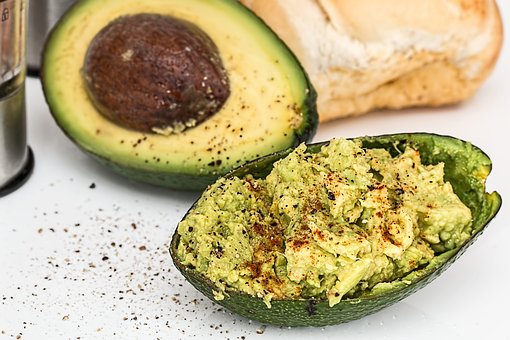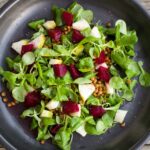The popularity of vegan diets has risen in the past few years, with an increase of up to 600% in the number of individuals who identify themselves as vegans between 2014 and 2017, according to certain reports. This trend can be attributed to the wider availability of vegan food options in regular grocery stores, the inclusion of vegan menu options in restaurants, and media headlines highlighting the health advantages of veganism.
Although a vegan diet has its benefits, it may not be suitable for everyone. According to some professionals, adhering to this diet can be challenging, and there are concerns about specific nutrients being insufficient in this diet. Prior to making a decision about adopting a vegan lifestyle, it is recommended to compare it with other similar diets.
According to the 2019 U.S. News and World Report Best Diets, the vegan diet is placed at number 20 among the Best Diets Overall, with an overall score of 3.1/5.
USDA Recommendations
Comparing a vegan diet to USDA recommendations or any other diet can be difficult as there is no universal vegan diet. Unlike weight loss or improved health diets, there are no specific macronutrient requirements, calorie guidelines or mandatory foods.
Rather than including specific foods, a vegan diet involves excluding animal-based products such as meat, poultry, seafood, dairy, eggs, and honey in certain instances. Consequently, there can be significant differences in nutritional content among varying vegan diets.
Nevertheless, research has analyzed vegan eating habits and obtained certain observations about the food and nutrient consumption on an ordinary vegan diet. Based on these hypothesis, the vegan diet can be contrasted with USDA recommendations and alternative diets.
Food Groups
Current USDA nutrition guidelines suggest that we consume foods including vegetables, fruit, grains, fat-free or low-fat dairy, protein, and oils. The guidelines also suggest that Americans limit saturated fats and trans fats, added sugars, and sodium.
Following a vegan diet allows for intake of foods from all but a single recommended food group. Research indicates that individuals on a vegan diet generally consume higher quantities of vegetables, grains, and beneficial oils compared to those on a non-vegan diet, with the exception of dairy products. In terms of dietary evaluations, nut-based milk substitutes are categorized as proteins instead of dairy products.
Following the USDA guidelines can lead you to unconsciously restrict certain foods. Meat and dairy products are the main sources of saturated fat in a regular American diet, but they are eliminated on a vegan diet.
Furthermore, processed foods are often avoided by a number of vegans due to concerns over their impact on health or due to the presence of animal-derived ingredients. Such foods tend to be high in added sugars and sodium content, and certain processed options are still known to contain trans fats.
Nutrients
Following a vegan diet may pose challenges when it comes to nutrient consumption. Research has indicated that individuals who adhere to this eating style may experience lower intake of protein, calcium, and vitamin B12. Moreover, vegan diets could potentially lack iron, iodine, and vitamin D as well.
Calcium cannot be produced by the human body on its own, and must be obtained through dietary sources or supplements.
The USDA recommends a daily consumption of 1,000 to 1,200 milligrams of calcium, which for a lot of individuals can be fulfilled by including dairy products in their diet.
As dairy is not consumed on a vegan diet, alternative calcium sources like kale, pinto beans, or fortified orange juice must be incorporated. According to a study, the average calcium intake for a vegan is approximately 738 milligrams daily.
B12 vitamin
A vegan diet could result in reduced consumption of vitamin B12, an essential nutrient that helps regulate metabolism and is predominantly present in animal and seafood-based foods. The USDA suggests a daily intake of 2.4 micrograms (mcg) of B12 for adults.
The American Academy of Nutrition and Dietetics states that if vegans do not regularly intake fortified foods or supplements containing B12, they could face a deficiency, as evidenced by case studies of vegan individuals of various ages, including infants.
Protein remains an essential component of a balanced diet.
Protein may be another concern for some, however, the American Academy of Nutrition and Dietetics states that people following vegan diets typically meet or exceed protein recommendations, provided caloric intakes are adequate. There are numerous vegan-friendly protein sources, such as tofu, nuts, seeds, legumes, and grains.
The USDA advises adults to obtain 10% to 35% of their daily calorie intake from protein. Researchers have conducted various assessments on plant-based eating and discovered that vegans usually consume around 13% to 14% of their calories from protein. This amount may be lower than a non-vegan’s protein intake, but it still falls within the recommended range.
Iron is a metallic chemical element with the symbol Fe and atomic number 26.
While beef is often associated with iron-rich foods, there exist various vegan options containing iron such as lentils, beans, cashews, potatoes, and green leafy vegetables like spinach. To increase iron absorption, it is recommended to combine iron-rich food sources with those enriched with vitamin C.
Iodine cannot be produced by the human body so it must be obtained from the diet.
A diet that mainly consists of plant-based food may lack iodine. An iodine deficiency may occur in vegans who do not include sea vegetables or iodized salt in their diet. It is important to verify if the sea salt used has iodine added.
Vitamin D is an essential nutrient that helps the body absorb calcium and maintain strong, healthy bones.
Low vitamin D intakes have been reported in some vegetarians and vegans, as well as low plasma or serum 25-hydroxyvitamin D levels. Since your body also makes vitamin D from sunlight, low vitamin D intake can be a problem in the winter and early spring, especially for individuals living at higher latitudes.4
Calories
Following a vegan diet does not impose limits on your calorie consumption. Unless your objective is to shed pounds, calorie counting is unnecessary in a vegan diet. In case you do desire to lose weight, diminishing portion sizes and opting for nutrient-dense, lower-calorie options may suffice. However, it is possible that this measure is not required.
Research indicates that individuals who adopt a vegan diet tend to consume fewer calories than those adhering to other dietary patterns. Even if they do not follow the vegan diet strictly, they are still expected to consume lesser calories and experience more weight loss compared to people following vegetarian, pesco-vegetarian, semi-vegetarian, or omnivorous diets.
If you decide to switch to a vegan diet, it is important to ensure that you are consuming enough energy. To determine your daily calorie requirement, you can utilize a calorie calculator, which considers factors such as your age, gender, objectives, and exercise intensity in order to provide the most suitable value for you.
Variety
Although transitioning to a vegan diet may require the elimination of many beloved foods from a typical omnivorous American diet, it may also encourage individuals to expand their food choices and opt for a more diverse range of options.
If you are not having any meat during your meals, you might want to consider incorporating high-protein grains or protein substitutes made from soybeans such as tofu, tempeh, or edamame. Additionally, since you will be consuming more vegetables, it could be beneficial to explore different types. Opting for seasonal fruits and vegetables while shopping can help you relish the tastiest and freshest produce at an affordable cost.
The rise in popularity of processed vegan foods may result in individuals consuming a less diverse and nutritious vegan diet. Certain plant-based alternatives, such as vegan microwave dinners and meat substitute burgers, contain numerous additives and preservatives which may not always represent the healthiest dietary option.
Alternate Diets
Understanding these restrictions is essential, as not all diets are appropriate for everyone. As a result, tailoring your diet to meet your body’s requirements is also advisable. The following diet alternatives are comparable to veganism but with some modifications.
Mediterranean Diet
While a Mediterranean diet does include animal products, they are only consumed sparingly. Instead, the emphasis is on vegetables, cereals, nuts, seeds, and healthful plant-based oils.
Foods containing high amounts of saturated fat, such as meat and dairy, are restricted, while those benefiting health, like whole grains and vegetables, are promoted. In addition, consuming limited amounts of meat and dairy is unlikely to cause deficiencies in protein, calcium, and vitamin levels.
Health Benefits of a Mediterranean Diet
The Mediterranean diet is frequently associated with various health advantages such as a reduced chance of developing cancer, heart diseases, and chronic ailments.
Losing Weight
Several researches have investigated the efficiency of the Mediterranean diet in reducing weight. All of them have discovered that following this meal plan can be as beneficial for weight loss as low-fat diets. Although it might not result in a considerable boost in weight loss, it can assist in preventing weight gain in the long run.
Sustainability
Unlike stricter plant-based diets such as veganism, the Mediterranean diet is highly sustainable as it advocates for consuming a wide variety of foods. However, the focus is on wholesome foods while unhealthy options are dismissed from the diet.
Flexitarian Diet
The main components of a flexitarian diet are vegetarian foods, but individuals who follow a flexitarian lifestyle have occasional meat and seafood consumption.
The nutrition provided by a flexitarian diet is comparable to that of a vegetarian diet, but including meat and seafood in moderation can provide extra protein and vitamin B12 to complement the plant-based diet.
Health Benefits of a Flexitarian Diet
Following a flexitarian diet, which is basically a vegetarian diet, can provide similar health benefits including enhanced heart health and decreased possibility of various chronic illnesses.
Losing Weight
Both the flexitarian and vegetarian diets can be advantageous for weight loss. Incorporating seafood or meat occasionally into a vegetarian diet is not expected to have a considerable effect on calorie consumption. However, since weight loss necessitates close monitoring, the flexitarian diet might have a slight edge in terms of effectiveness.
Including meals that are centered around meat can aid in sustaining your diet for a prolonged period, resulting in weight loss and the upkeep of a healthy weight.
Sustainability
Despite research indicating negligible variance in compliance between plant-based meal patterns, professionals argue that a flexitarian diet is considerably more attainable as it allows for occasional indulgences. Moreover, it accommodates activities such as traveling, dining out, and socializing with friends.
Pescatarian Diet
Mostly relying on plant-based foods, a pescatarian diet includes fish and seafood for additional protein intake and for the intake of healthy fats, specifically omega-3 fatty acids.
Health Benefits of a Pescatarian Diet
While consuming seafood high in omega-3 fatty acids, like salmon, mackerel, or tuna, may offer added assistance, this diet yields the same health advantages as a vegetarian diet.
In comparison to breaded or processed fish, fresh fish contains less fat, salt, and other artificial additives. These fatty acids are helpful in keeping arteries healthy, decreasing LDL cholesterol, and reducing both triglyceride and blood pressure levels.
Losing Weight
The efficacy of this diet is expected to match that of a vegetarian diet, but the inclusion of fish might result in a minor rise in calorie intake, satisfaction, and compliance.
Sustainability
If you regularly consume fish, this diet should be sustainable for you. However, those who do not frequently eat fish may struggle. Preparing fish as a regular meal is not a suitable choice for everyone.
Tips to Start a Vegan Diet
Adopting a more eco-friendly diet can be a seamless process. Initially, you may choose to raise the quantity of cooked or uncooked vegetables you have with each meal. Gradually, you could introduce vegetarian dinners one or two evenings each week. As time goes on, you can add more veggie-based options to your meals until you are content and contented with the new diet.
Try out various grains, legumes, veggies, and spices to jazz up your meals and make them more appetizing. Believing that veggies are mundane might be a misperception. Additionally, you can explore diverse cuisines that offer distinct tastes.
One option is to ask the chef to exchange the meat for beans while dining out. Another good strategy is to select vegetable-based appetizers and sides from the salad bar. Furthermore, visiting ethnic restaurants offering a wide selection of vegan and vegetarian options such as Indian, Thai, Mexican or Chinese establishments can be quite beneficial.
Additional remarks.
There is a wide variety of diets to choose from, but studies confirm that a well-rounded and nourishing diet is essential for optimal health and fitness.
When opting for a diet, it’s important to avoid being too strict and allow your body to adjust to the changes. Assess whether the diet is satisfying and energizing for you. Consult with a dietician and doctor to improve your meal planning and ensure proper nutrition if you have any medical conditions.



